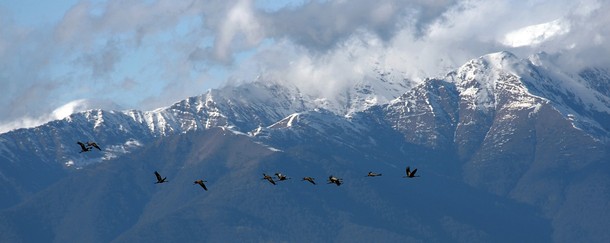
From Thomas de Waal, Foreign Policy: A third mirage is the perception of the South Caucasus as an area of great Western strategic interest — an approach, paradoxically, that actually does more harm than good.
Two factors have led to the point of view that the South Caucasus is of such global import: first, the desire to see the region as a new essential energy corridor for the West; second, the desire to see it as a zone for NATO enlargement.
In energy terms, the South Caucasus is indeed an important transport corridor for Caspian Sea oil and gas; there were good reasons why Azerbaijan needed pipeline routes independent of Russia and Iran. Oil pumped through the Baku-Tbilisi-Ceyhan pipeline has also brought billions of dollars of much-needed revenue to Azerbaijan — and rather less to Georgia. Caspian Sea gas has lessened the reliance of both countries on Russian gas. But many Western policymakers have incorrectly treated pipeline policy as a zero-sum strategic game. …
These metaphors unduly raised the hopes of small nations that they were essential to the West, while antagonizing Russia. In retrospect, strategic ambitions to establish a position in the region ran ahead of a more sober assessment of its place on the European energy map and its economic needs.
The second grand strategic vision imposed on the Caucasus the West was that of NATO expansion into Georgia. The issue on the table was not really Georgia’s right to join NATO — something that the Georgian public voted for by a good majority in a referendum. The issue was whether active pursuit of this was a good policy for either Georgia or NATO – it is now clear that it was not. The effort did not improve Georgia’s security, and NATO was not ready for a country with undeveloped armed forces and weak state institutions, as well as two unresolved conflicts on its territory. As became clear in August 2008, Georgian President Mikhail Saakashvili believed he had far more support in Washington for his actions over South Ossetia than he actually did. When that conflict had played itself out, Georgia was left with neither Abkhazia and South Ossetia, nor a Membership Action Plan for joining NATO.
Far better than this kind of rhetorical and selective strategic engagement would have been more focused lower-level investment in institution-building. That would at least have allowed the locals to make sober assessments of their own capacities and what they themselves should ask from Western patrons with limited attention spans. This leads me to the paradoxical thought that a healthy dose of strategic insignificance would be very positive for the South Caucasus. Viewing the region in this light would allow outsiders and locals alike to concentrate on solving essential everyday problems.
Thomas de Waal is a senior associate at the Carnegie Endowment for International Peace and author of The Caucasus: An Introduction, published this week by Oxford University Press. (photo: Getty)
Image: getty%209%2014%2010%20Caucasus%20mountains.jpg
